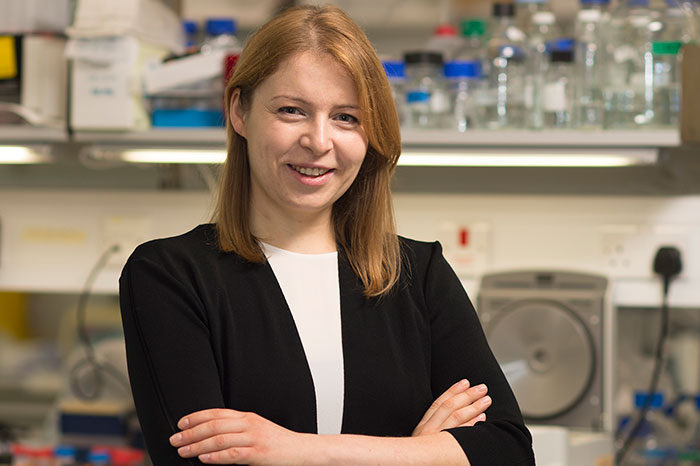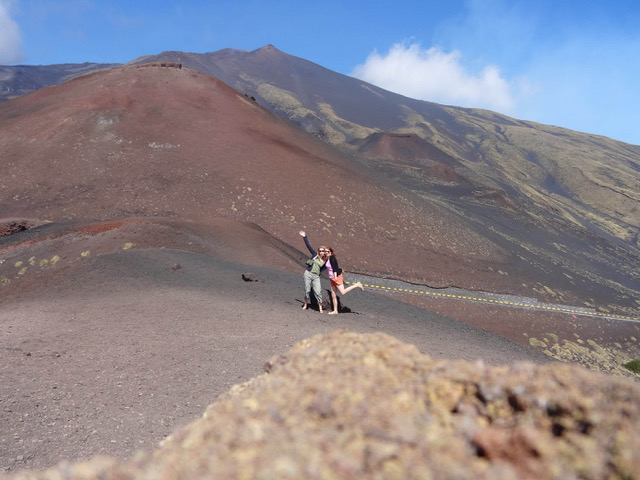Next in our series of Group Leader profiles based on interviews with science writer and LMB alumna, Kathy Weston, is a profile of Patrycja Kozik, a Group Leader in the LMB’s PNAC Division.

Growing up in Poland, Patrycja Kozik was fascinated by astronomy and biology, but says that biology easily won once she found out that what she saw in the heavens was old news. “When I realised that starlight takes so long to reach us and that you would need to wait for several years for results of any ‘experiment’, I lost interest”, she laughs. “What happens inside cells you can see immediately under a microscope!”
Patrycja’s career trajectory gives the impression that she relishes opportunities to challenge herself. As a teenager, she decided to apply to a school at the other end of Poland that offered the science curriculum she wanted to follow, even though it meant going there without her family; after school, she then left the country entirely to attend the brand new Jacobs University Bremen as one of its first undergraduates. “it’s a good thing my Dad likes to drive”, she says, “as Bremen was 1000km away – it was even worse than taking me to school.”
Despite being surrounded by barbed wire for her first year in Bremen (the university is built on the site of an old American base, and was not entirely finished when the first intake arrived), Patrycja had a good time there. Thanks to one of the new professors, Sebastian Springer, she got interested in organelles and membrane trafficking, to the extent that she wrote to Ben Glick, a major figure in the field in Chicago, and was offered an all-expenses-paid summer internship with him. I was really intimidated by Ben, even though he was very nice to me”, she says. “I was quite shy in those days!” Happily, by the end of her undergraduate career, Patrycja’s shyness had been overridden by the realisation of how much fun it was talking about science to like-minded people. Nowadays, she says, “one of the hardest things about being a group leader is I end up sitting in my office a lot, and I don’t interact with people as much as I’d like!”

After Bremen, Patrycja moved to Cambridge to do a PhD with Margaret (Scottie) Robinson at the Cambridge Institute of Medical Research, looking for new machinery involved in vesicle formation. She cites Scottie as a major influence on both her science and the way she runs her lab: “I was seriously ill at the end of my PhD, and had to take quite a lot of time off, and Scottie was incredibly supportive”, says Patrycja. “There was a period when I wasn’t sure I’d be able to carry on in science, and she helped me through that, until I was feeling better and started to enjoy things again.”
The resurgent Patrycja applied for a highly competitive Henry Wellcome Fellowship, was ranked first out of all that year’s applicants, and went off to the Institut Curie in Paris to do a postdoc, also spending time at the Broad Institute in Boston. During her postdoc, Patrycja began to move into her present field of dendritic cell biology, although she categorises herself as a cell biologist who is interested in immune cells, rather than a straight-up immunologist: “What fascinates me about the immune system is the unique cell biology of the cells involved”, she says. “It’s pretty amazing how one cell type has evolved to produce huge amounts of antibodies, another can eat and destroy bacteria, and yet another can rapidly kill cancer cells”.
Patrycja has had a lab at the LMB since 2016, studying how dendritic cells initiate immune responses. “Antigens from infected or cancer cells are gobbled up by dendritic cells, which process them and present them to T cells”, she says. “We’re interested in the cell biology of the events underlying antigen processing and presentation. We’re asking questions about how dendritic cells handle the antigens from tumours and virally infected cells, and how the protein trafficking events in dendritic cells are regulated by signals associated with the antigen.” In their first two years at the LMB, Patrycja and her lab have concentrated on developing new assays to address these questions and, using CRISPR screening approaches to edit cell genomes, they’ve now identified some new exciting players.

Like all her previous moves, Patrycja applied to the LMB, which she already knew well from her time with Scottie, with impressive bravado: “At some point during the interview I thought there was no way I would be selected for the job, but I decided not to let that show. I guess I’ve learnt that it helps to act confident. Deep down though, I believe self-confidence is overvalued, and often the person who comes across as unsure is actually being more realistic.”
As is evident from her life to date, Patrycja says she’s happiest when there’s a lot going on: “My life often seems chaotic to others, but that’s when I thrive, despite not really liking the uncertainty that it sometimes brings” she says. “I’ve accepted that this is how I am, and when I feel overwhelmed, I do try to remember that in the past I somehow survived!”
Coming to a place like the LMB can be intimidating, Patrycja thinks, but she cautions against trying to be positive all the time. “I prefer to talk to people about things that are difficult, because that’s more helpful”, she says. “If we only talked about the things that have already worked, that doesn’t give a true image of how science progresses, and it doesn’t provide us with opportunities to learn from each other.”
Asked to sum up her philosophy, Patrycja has some very good advice: “I think that it’s best to be yourself, as otherwise you only end up frustrated”, she says. “And you shouldn’t let your insecurities stop you from doing what you really want to do: just go for it!”
This article is based on an interview by Kathy Weston, February 2019.